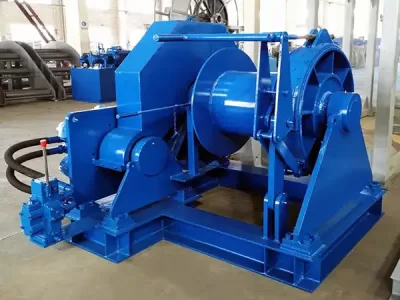The Benefits of Hydraulic Winches in the Marine Industry

The marine industry, with its challenging and often unpredictable conditions, demands equipment that is durable, powerful, and reliable. Among the most essential pieces of equipment for various marine applications, hydraulic winch stand out as the go-to solution for many operators. These winches offer the power, efficiency, and resilience required for tasks such as anchoring, towing, lifting, and recovery, all of which are critical in marine operations.
In this blog, we will explore the various benefits of using hydraulic winches in the marine industry and why they have become a top choice for marine professionals.
What is a Hydraulic Winch?
A hydraulic winch is a mechanical device powered by a hydraulic motor. Unlike electric winches that use an electrical motor, hydraulic winches rely on a hydraulic system that utilizes fluid to generate the mechanical force necessary to pull heavy loads. This means hydraulic winches can generate a higher torque output for extended periods, making them ideal for demanding marine applications.
Why Are Hydraulic Winches Ideal for Marine Applications?
In the marine industry, winches are used for a variety of tasks, including raising and lowering anchors, towing boats, hauling fishing nets, and recovering vessels. Given the environment’s extreme conditions—saltwater exposure, high humidity, and rough sea conditions—a hydraulic winch offers several distinct advantages over other types of winches.
Let’s break down the key benefits of hydraulic winches in the marine industry:
1. Unmatched Power and Performance
The primary benefit of hydraulic winches in marine operations is their unparalleled power and torque. Hydraulic motors are capable of generating consistent, high levels of torque, which is essential when dealing with heavy loads, such as anchoring large vessels or towing boats. The higher the torque, the more weight a winch can pull, and hydraulic winches excel in this area.
In contrast, electric winches often experience power loss when handling heavier loads or working for extended periods, as their electrical motors may overheat. hydraulic winch, however, can perform under continuous heavy-duty use without losing performance, making them the best choice for marine tasks that require sustained, high-efficiency power.
2. Durability in Harsh Environments
One of the most significant advantages of hydraulic winches in marine settings is their durability in harsh environments. Saltwater is corrosive and can damage electrical systems and machinery. Hydraulic winches are designed to withstand these extreme conditions, with many models featuring corrosion-resistant components, seals, and coatings that protect the winch from rust and wear.
The hydraulic systems are typically enclosed in durable, weather-resistant housings, ensuring the winch performs optimally despite exposure to saltwater, high winds, and rough conditions. Additionally, hydraulic winches tend to be more robust and resistant to physical damage compared to electric winches, which makes them the ideal choice for marine professionals who need reliable equipment under difficult conditions.
3. Continuous Operation Without Overheating
In marine applications, the tasks performed with winches can often require long hours of continuous operation, such as during towing operations or while deploying and retrieving anchors. Electric winches can overheat when used continuously under heavy load, which can lead to equipment failure and costly repairs. Hydraulic winches, however, are less prone to overheating, as they don’t rely on electrical motors but rather on a hydraulic pump that moves fluid to generate power.
Since hydraulic winches are not subject to overheating the way electric winches are, they are ideal for applications requiring extended periods of continuous operation. This makes hydraulic winches essential for marine professionals who cannot afford downtime or equipment failure during critical tasks such as anchoring in deep water or towing large vessels.
4. Higher Line Speed and Efficiency
Hydraulic winches generally offer a higher line speed than their electric counterparts. This is important when speed is a critical factor in the operation. For example, when recovering a vessel, having a winch with a higher line speed ensures the process is completed more quickly and efficiently. In marine environments where time is often of the essence, a faster winch can improve productivity and reduce delays.
Moreover, hydraulic winches are designed to operate with high efficiency, meaning they can perform heavy-duty tasks while consuming less energy compared to electric winches. This energy efficiency is particularly valuable in marine settings where operational costs can be significant.
5. Easy Integration with Existing Hydraulic Systems
Many marine vessels already have hydraulic systems in place, which makes integrating a hydraulic winch an easy and cost-effective solution. Since hydraulic winches are powered by the vessel’s existing hydraulic system, there’s no need to install additional power sources or electrical systems. This can save both time and money during installation and reduce maintenance costs in the long run.
Additionally, because hydraulic systems are typically more reliable than electrical systems, integrating a hydraulic winch into a boat or ship’s existing setup can improve the overall performance of the vessel’s operational machinery.
6. Better Control and Safety Features
Hydraulic winches come with advanced control systems that offer better precision and smoother operation. This is particularly important in marine applications where the loads being moved may be heavy, and the risk of accidents is high.
For instance, hydraulic winches allow for variable speed control, giving the operator the ability to adjust the winch’s speed depending on the situation. Whether you’re anchoring a vessel in calm waters or towing in rough seas, having the ability to control the speed and force of the winch helps ensure safety and effectiveness.
Additionally, hydraulic winches are generally equipped with safety features, such as automatic load-limiting functions and overload protection, which help prevent damage to the winch, the boat, and the load being moved. This enhances both the safety of the crew and the equipment.
7. Versatility Across Marine Applications
Hydraulic winches are extremely versatile and can be used for a wide range of marine operations. Some of the most common applications include:
-
Towing: Whether you’re towing smaller boats or large ships, hydraulic winches provide the power needed to move vessels over long distances without strain.
-
Anchoring: Hydraulic winches make anchoring and mooring vessels in deep waters quick and easy. Their high power and torque ensure the anchor is set properly and securely, even in strong currents.
-
Fishing: In commercial fishing, hydraulic winches are used to haul in fishing nets. Their continuous operation and high pulling power make them perfect for retrieving large and heavy nets.
-
Salvage and Recovery: Hydraulic winches are crucial in vessel recovery situations, where fast and powerful winching is needed to rescue a stranded boat or ship.
-
Docking and Mooring: Many larger vessels use hydraulic winches for docking and mooring, where the winch plays a vital role in securing the vessel safely to the dock.
Given the various tasks that hydraulic winches can handle, they are indispensable in modern marine operations, providing reliable performance across a wide range of applications.
8. Reduced Maintenance Costs
Because hydraulic winches are less likely to experience the overheating issues that electric winches face, they tend to have a longer lifespan and require less maintenance. With fewer electrical components to manage, hydraulic winches have fewer parts that are vulnerable to failure, which results in lower maintenance costs over time.
Regular maintenance for a hydraulic winch typically involves checking the hydraulic fluid, inspecting seals, and ensuring the system is functioning properly. In comparison, electric winches often require more frequent inspections and repairs related to electrical components, which can increase downtime and repair costs.
9. Long-Term Investment
Although hydraulic winches often come with a higher initial investment compared to electric winches, the long-term benefits far outweigh the upfront cost. With their durability, efficiency, and superior performance in heavy-duty applications, hydraulic winches offer a higher return on investment over time. Their ability to perform reliably in tough marine conditions and reduce downtime can result in significant cost savings in the long run.
Conclusion
Hydraulic winches are an essential tool in the marine industry, providing the power, durability, and reliability needed to handle the demanding tasks associated with anchoring, towing, lifting, and recovery. Whether you’re operating a fishing vessel, tugboat, or large cruise ship, hydraulic winches deliver the continuous performance and safety features that are critical in marine environments.
By choosing a hydraulic winch, marine professionals can ensure they are equipped with reliable, efficient, and long-lasting equipment that can withstand the toughest conditions. With their superior power, ability to operate without overheating, and resistance to corrosion, hydraulic winches are a smart investment for any marine operation.









